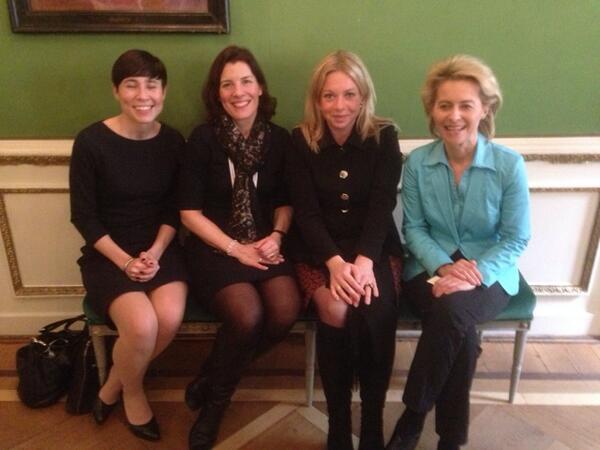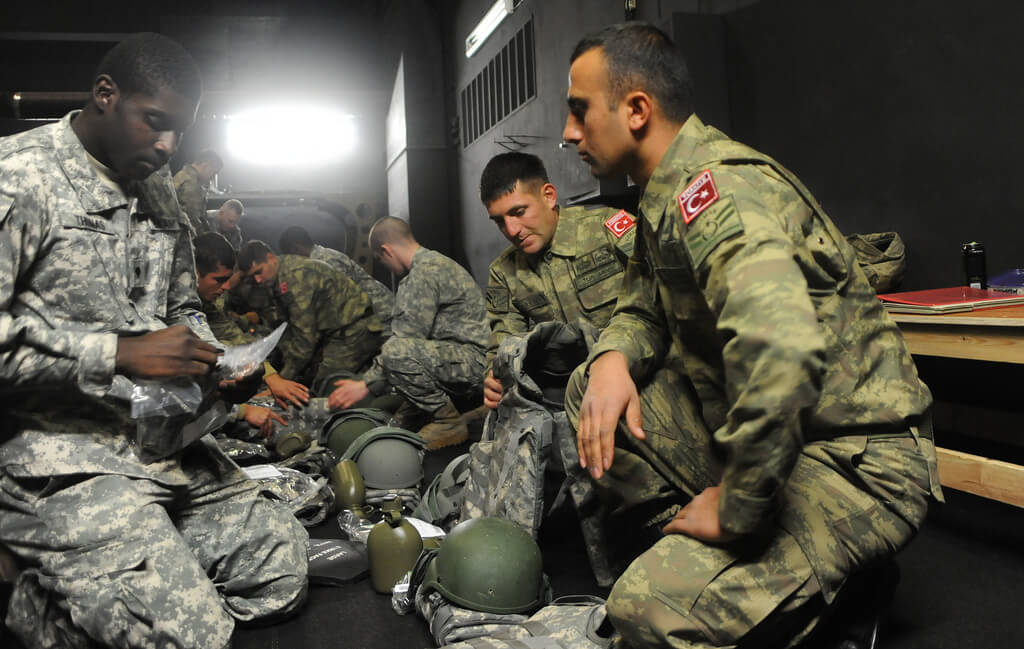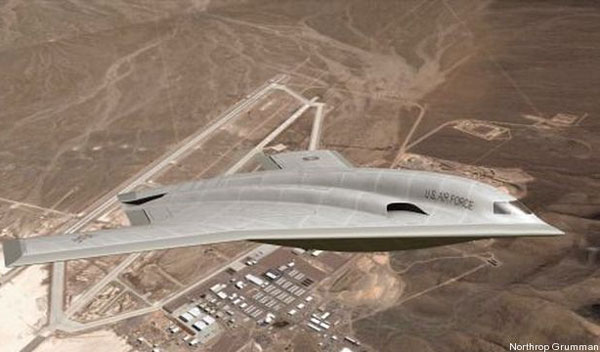
You did not have to see the film G.I. Jane to sympathize with the rigors that women often struggle with while serving their country. The chauvinistic attitudes directed at them in the armed forces is an all too familiar experience. As a result of a leadership that is almost entirely composed of males, it was once unthinkable not so long ago that women could ascend to senior positions. Thankfully, however, this antiquated view has lost its traction and suddenly it seems positions of influence traditionally reserved for the “old boys club” are being reconfigured by a new generation of women defence personnel.
A recent photo posted to Dutch Defence Minister Jeannie Hennis-Plasschaert’s Twitter account captured the growing trend of women as prominent executors of defence policy. The photo welcomed Germany’s Ursula von der Leyen to the new sorority of female defence ministers. Von der Leyen is Germany’s first female defence minister and her precedent-setting appointment requires us to evaluate the increased importance women are playing in both the public and private sectors of defence.
On a national level, Europe enjoys an edge in unleashing female productivity in the political sphere. The integration of woman into the defence apparatus is a phenomenon that has also been spearheaded by our Transatlantic neighbours, which began in Finland. From 1990 to 1995, Elisabeth Rehn distinguished herself as the first ever European minister of defence. During her time as Defence Minister, a law allowing Finish women between the age of 18 and 30 to enlist with the Defence Forces was enacted. Although it’s not frequently discussed, Canada’s national defence establishment was led by Kim Campbell for six months in 1993. Her time in office was marked by the now infamous Canadian Sea King replacement and the Somalia Affair.

The defence portfolios of India and Pakistan have also been administered by women. From 1980 to 1982, Indira Ghandi led India’s forces while Benazir Bhutto commanded Pakistan’s military from 1988 to 1990. It is also worth recognizing that both were tasked with managing nuclear arsenals during periods of intense rivalry.
To date the governments of Norway, Sweden, Germany, Netherlands, Italy and Albania have all trusted their defence policies to woman. What is remarkable about this group of women is that they nearly all arrived at their positions without formal military backgrounds. This challenges the concept that experience in the military is a prerequisite to competently lead the armed forces. For example, current Italian Defence Minister Roberta Pinotti started her political career as a local counsellor for the Communist party and Minister von der Leyen was the former Labour Minister and strong advocate of a united Europe. Only Swedish Defence Minister Karin Enström is separated with her experience serving with the armed forces having served as a Captain in the Swedish Amphibious Corps.
The increased number in women as defence ministers in Europe has, however, by no means injected a new spirit of dovish pragmatism to policy planning. Listening to Minister Hennis-Plasschaert speaking at the Berlin Strategy Conference last May, it’s evident that woman value the utility of military force as much as men. The minister maintained that “All of us should feel ownership when it comes to enhancing our strength, maximizing the use of our capabilities and optimizing our joined operations.”
In addition to reversing the sexist preconceptions about their willingness to assert hard power through either economic or military means, these ministers have had to operate under further constraints. Dwindling defence budgets coupled with a public disaccord to intervene abroad are issues complicating their respective ministries. In fact only Norwegian Minister Ine Eriksen Søreide was lucky enough to have an increased defence budget compared to her NATO counterparts.
A major breakthrough in Washington came last year. Secretary of Defense Hagel announced that Christine Fox would become the Acting Deputy Secretary of Defence. Hagel’s announcement represented the highest appointment for women in the American Department of Defence. It confirmed that improvement was gradually taking root in the world’s largest defence department.
Progress for women in the private sector has also manifested itself. To date women occupy fifty percent of defence CEO positions compared to only four percent of Fortune 500 companies. Their professionalism in turning around faltering projects at Lockheed Martin and General Dynamics has not gone unnoticed. Congresswoman Kay Granger, vice chairman of the House Defense Appropriations subcommittee said that “Women tend to be problem solvers by nature. In many cases, that trait becomes more important than having a particular title, their name on the door or the highest salary.” This gradual influx of women in to senior private positions has only reinforced their role within the industry.

Despite women’s assuming a more prevalent role in defence, further integration must be encouraged. Reform should be especially targeted on the national level. According to the Stockholm International Peace Research Institute (SIPRI), of the top 15 countries with the highest military expenditures, only Germany (ranked ninth) and Italy (tenth) have female ministers. Canada ranks fourteenth on SIPRI’s expenditure list while its military procurement strategy is managed by Diane Finely, Minister of Public Works and Government Services.
One institution that should take a reflective look is NATO. To date there has never been a female Secretary General. The earliest possible candidacy for a woman would arrive in 2018 and current Lithuanian President Dalia Grybauskaitė would be a prime candidate for consideration. Prior to assuming the Presidency in 2009, her experience as the Vice-Minister of Foreign Affairs, Minister of Finance as well as a European Commissioner provides her with the optimal skill set to guide NATO in the future. President Grybauskaitė has also refused to yield to Russian intimidation throughout the annexation of Crimea, “Europe must understand that Russia is trying to redraw the post-war map and borders.”
There is no denying today that women are significant contributors to the international defence apparatus. What is even harder to deny is that they will not continue to expand their influence throughout the industry. Only envious rivals would discount their current achievements. Whether in the public or private sector, women exude confident leadership and have proved that they can cope with the hardships of defence. As the fog of war occasionally creeps into foreign affairs, it is reassuring to know women will be called on to manage crises.




